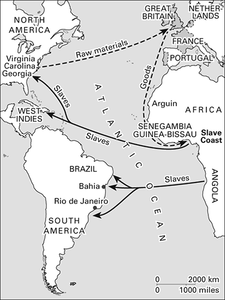The trade in which Europeans captured people in Africa and transported them as slaves mainly to the Americas, where slave labour enabled colonists to establish plantations. Following their 15th-century discoveries, the Portuguese began taking slaves from Senegambia and Guinea-Bissau: they went to Portugal, the Atlantic islands, and later to the Americas; by the 16th century they came also from Angola, and, occasionally, Mozambique. In the 17th century trading forts, stretching from Arguin (now in Mauritania) to Angola, had been established by slavers from Brandenburg, Denmark, Holland, Courland (on the eastern Baltic), England, France, Genoa, and Sweden. These forts could not have operated without active African participation in supplying slaves for shipment to Brazil, and to British, French, Dutch, and Spanish colonies. It is thought that by the mid-19th century 9.5 million Africans had been transported to the New World, in addition to those who died while being captured or in transit. This figure does not include the Arab slave trade nor the flourishing trade in slaves within Africa. Disgust at this treatment of Africans led to demands for emancipation of the slaves and the abolition of the slave trade in the 19th century. (See also slavery; slaves, us proclamation for the emancipation of; slave trade, abolition of.)

African slave trade. The African slave trade reached its height during the 17th and 18th centuries. Several hundred thousand Africans were transported across the Atlantic each year, to the plantations of the European colonies in the Americas. It was a triangular trade. A typical three-leg voyage set out from Europe to West Africa, carrying cotton goods, hardware, and, increasingly, guns. These goods were exchanged for slaves, who were taken to the West Indies and the southern colonies of North America. The ships returned to Europe with colonial produce, notably sugar.
Source: MAPS IN MINUTES™ © RH Publications (1997)
- present discounted value
- presentism, pastism
- preservation
- President's Scientific Advisory Committee
- Presocratics
- pre-splitting
- pressgang
- pressing
- PRESS statistic
- pressure
- pressure bladder
- pressure broadening
- pressure-depth profile
- pressure dissolution
- pressure drop
- pressure drop multiplier
- pressure flow
- pressure fringe
- pressure gauge
- pressure gradient
- pressure-gradient force
- pressure group
- pressure head
- pressure melting
- pressure melting point